This policy is a draft and is awaiting approval by the Academy Council.

Our SEND policy and information report aims to:
A child or a young person has SEND if they have a learning difficulty or a disability which calls for special educational provision to be made for him/her namely provision which is additional to or different from what is ordinarily available in a differentiated curriculum.
A child of compulsory school age or a young person has a learning difficulty or disability if they:
(Section 20 Children and Families Act 2014) Children must not be regarded as having a learning difficulty solely because the language or form of language of their home is different from the language in which they will be taught.
Under the SEND Code of Practice 2015 pupils identified as having special educational needs (SEN), will be considered within one or more of the following categories:
Children with learning needs may learn at a slower pace than other children and have difficulty developing literacy and or numeracy skills or understanding new concepts. Learning needs may be in addition to, or as a result of other special educational needs. Children with a specific learning difficulty (SpLD) will have difficulties related to one or more of the following; dyslexia (reading and spelling), dyscalculia (Maths), dyspraxia (co-ordination) and dysgraphia (writing). Learning difficulties range over a wide range of needs. These include; moderate learning difficulties (MLD), severe learning difficulties (SLD), profound and multiple learning difficulties (PMLD). Children with PMLD are likely to have severe and complex learning difficulties, as well as physical disability or sensory impairment.
Children may experience a wide range of social and emotional difficulties, which manifest themselves in many ways. These may include becoming withdrawn and isolated, as well as displaying challenging, disruptive or disturbing behaviour. These behaviours may reflect underlying mental health difficulties such as anxiety or depression, self-harming, substance misuse, eating disorders or physical symptoms that are medically unexplained. Other children may have needs such as; Attention Deficit Disorder, Attention Deficit Hyperactive Disorder or Attachment Disorder.
Children with speech, language and communication needs (SLCN) have difficulty in communicating with others. This may be because they have difficulty saying what they want to, understanding what is being said to them, or because they do not understand or use social rules of communication. The profile of every child with SLCN is different and their needs may change over time. They may have difficulty with one, some or all of the different aspects of speech, language and social communication at different times of their lives. Children with Autism, including Asperger’s Syndrome, are likely to have particular difficulties with social interaction. They may also experience difficulties with language, communication and imagination, which can impact on how they relate to others.
Some children require special educational provision because they have a disability that prevents or hinders them, from making use of educational facilities universally provided. These difficulties can be age related and can fluctuate over time. Many children with vision impairment (VI), hearing impairment (HI) or a multisensory impairment (MSI) will require specialist support and/or equipment to access their learning. Children with MSI have a combination of vision and hearing difficulties. Some children with a Physical Difficulty (PD) require additional ongoing support and equipment to access all the opportunities available to their peers.
 Equitable provision for all
Equitable provision for allAt Minerva, we believe that every child is valued equally, and every teacher is a teacher of SEND. We believe in equitable educational experiences for all, and we believe that all children are unique individuals and at Minerva Primary school they are equipped to make progress so that they achieve their best and become confident individuals who know the positive contribution they have to make to the world. We believe in early and effective identification of needs, the elimination of barriers to learning and precise and personalised provision to meets those needs without stigma or compromise.

Somerset’s Local Offer is information on the services available for children and young people with Special Educational Needs between 0 – 25 and how to access them.

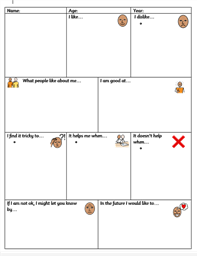 IEPs
IEPsAn Individual Education plan (IEP) will be developed for all children on the SEN register.
Children contribute to their IEPs about what helps them to learn, what they need to do well, what they are good at and what they find difficult.
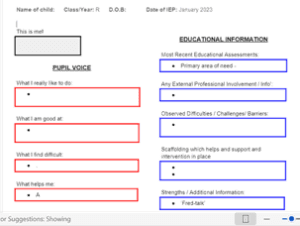
SMART Targets will be written for all children with an IEP. These will be reviewed termly and discussed with parents then re-set.
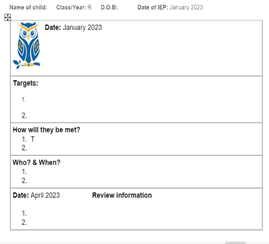
| Name: | Term: | Start date: |
| Strengths and need: | Target:  |
|
| Provision & Strategies: | ||
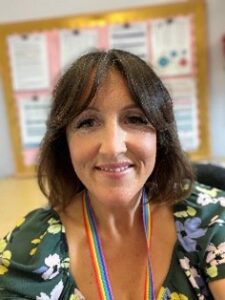 Mrs Rachelle Billington is the SENDCo at Minerva Primary school. She is responsible for assessing, monitoring and co-ordinating the provision for all the children with special educational needs in the school and ensuring the children with Special educational needs are making good progress.
Mrs Rachelle Billington is the SENDCo at Minerva Primary school. She is responsible for assessing, monitoring and co-ordinating the provision for all the children with special educational needs in the school and ensuring the children with Special educational needs are making good progress.
In addition to this, Mrs Billington is responsible for developing the school’s overall vision and approach to SEND and supporting all teachers in their teaching and learning of SEND.
Class teachers are the first person to speak to if you have any questions or concerns regarding children’s progress.
The SEND Governor will:
 Each class teacher, instructor or key worker is responsible for:
Each class teacher, instructor or key worker is responsible for:
 Every child is involved in reviewing their IEP, and their voice is included on it. We try to maintain a constant dialogue with our children to ensure we hear what they say about their learning – what is working for them, what is not, how we can make things better for them to make it as easy as possible to help them reach their full potential and overcome their individual barriers to learning. We try to be responsive to what children tell us about how we can improve their learning environment and adapt to meet their needs, within the constraints of the school building and budget!
Every child is involved in reviewing their IEP, and their voice is included on it. We try to maintain a constant dialogue with our children to ensure we hear what they say about their learning – what is working for them, what is not, how we can make things better for them to make it as easy as possible to help them reach their full potential and overcome their individual barriers to learning. We try to be responsive to what children tell us about how we can improve their learning environment and adapt to meet their needs, within the constraints of the school building and budget!
We will maintain close, positive and early contact with all parents. We know how helpful it is to have good home school communication and teachers will always be happy to speak to you. Please make an appointment though the school office. regular parent meetings.
Parents will be:
Minerva Primary School follows the four-part process, Assess, Plan, Do, Review.
All our actions are taken in a Graduated Response, this means that this structured approach of APDR is used to ensure that all children receive the right level of support at the right time to meet their needs.
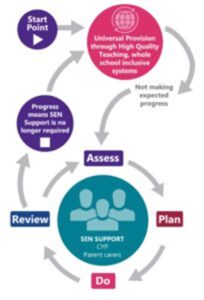
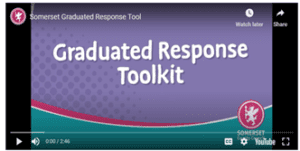
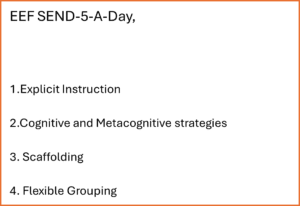
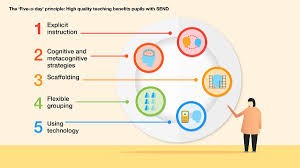
If your child’s needs have been identified before starting school, we may hold a School Entry Meeting with you, and everyone involved in your child’s care to ensure that the school is ready to meet their needs when they start in Reception. This plan will include any agencies involved during Nursery, and will be reviewed in the first term once the children have settled in.
This policy and SEND Information Report was created by the Senior Leadership Team through consultation with stakeholders and specialists from outside agencies including Educational Psychologists, Speech and Language Therapists and other outside agencies, who work with the school. It was shared and discussed with the school Academy Council.
This policy should be read in conjunction with:
